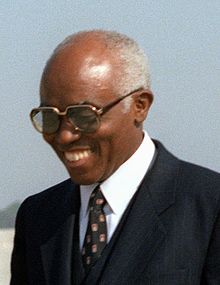ON THE RECENT DEATH OF PRESIDENT ARISTIDES MARIA PEREIRA
A message from Ernestina Commission vice-chair Laura Pires-Hester:
I am honored to offer a brief tribute to the President Aristides Maria Pereira. Born on the small island of Boa Vista in 1923, he died recently in Lisbon Portugal, at the age of 87.  I was blessed to be in his presence a couple of times. The first time occurred when he greeted us as the first group of Cape Verdeans and Cape Verdean-Americans invited by the government to the newly-independent Republic of Cape Verde in 1981. What struck me most was his gentleness and kindliness of spirit, focusing on each of us in turn.
I was blessed to be in his presence a couple of times. The first time occurred when he greeted us as the first group of Cape Verdeans and Cape Verdean-Americans invited by the government to the newly-independent Republic of Cape Verde in 1981. What struck me most was his gentleness and kindliness of spirit, focusing on each of us in turn.
As a Cape Verdean-American woman and anthropologist, I have been keenly interested in the history of independence of Cape Verde and its subsequent development, and therefore clearly impressed with his significant contribution to both. He was one of the closest confidantes and compatriots to Amilcar Cabral, the leader of the Independence movement, and co-founded the PAIGC (Partido Africano da Independencia da Guine e Cabo Verde) with Cabral in 1956. After Cabral’s untimely assassination in 1973, Pereira became the new country’s first President in 1975 and served three terms. He became a leader not only of the new country but also highly-regarded internationally. For example, he and Cape Verde played an important mediating role in southern Africa issues. I remember at that time that one international writer characterized that role as an important “honest broker.”
The new President agreed to allow Ernestina to come to the United States in 1976 to participate in the Bicentennial OpSail in New York, which unfortunately ended in her dismasting, and then to his decision to make a gift of the Schooner to the people of the United States. When Ernestina was preparing for her historic return and repatriation voyage in July 1982, President Pereira came aboard and bade farewell and Godspeed to the Cape Verdean and American crew of fourteen. He himself visited the United States for the first time in 1983, and at that time Voz di Povo recorded his comment:
“I must say that this visit left me immensely impressed, particularly to see a community that is not only large but also very old. That is to say, they are a people who feel sentimentally linked to Cape Verde and who religiously transmit all our cultural ways to their children, from generation to generation, from family to family.”
I give thanks for his life, for his commitment and sacrifices for human betterment, and extend condolences and prayers to his wife Carlina and family, friends, and all who knew and worked with him.
This entry was posted in Commission, News. Bookmark the permalink.
← Working Waterfront Festival | Ernestina’s Almost Ready to Return to State Pier →







